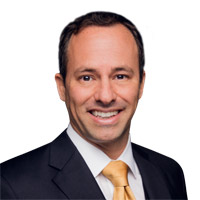Mutual Funds vs. ETFs: Why Choose One When You Can Use Both?
One tends to be cheaper to own and the other tends to perform better during down markets. That's why I recommend going with a combo strategy.


Profit and prosper with the best of Kiplinger's advice on investing, taxes, retirement, personal finance and much more. Delivered daily. Enter your email in the box and click Sign Me Up.
You are now subscribed
Your newsletter sign-up was successful
Want to add more newsletters?

Delivered daily
Kiplinger Today
Profit and prosper with the best of Kiplinger's advice on investing, taxes, retirement, personal finance and much more delivered daily. Smart money moves start here.

Sent five days a week
Kiplinger A Step Ahead
Get practical help to make better financial decisions in your everyday life, from spending to savings on top deals.

Delivered daily
Kiplinger Closing Bell
Get today's biggest financial and investing headlines delivered to your inbox every day the U.S. stock market is open.

Sent twice a week
Kiplinger Adviser Intel
Financial pros across the country share best practices and fresh tactics to preserve and grow your wealth.

Delivered weekly
Kiplinger Tax Tips
Trim your federal and state tax bills with practical tax-planning and tax-cutting strategies.

Sent twice a week
Kiplinger Retirement Tips
Your twice-a-week guide to planning and enjoying a financially secure and richly rewarding retirement

Sent bimonthly.
Kiplinger Adviser Angle
Insights for advisers, wealth managers and other financial professionals.

Sent twice a week
Kiplinger Investing Weekly
Your twice-a-week roundup of promising stocks, funds, companies and industries you should consider, ones you should avoid, and why.

Sent weekly for six weeks
Kiplinger Invest for Retirement
Your step-by-step six-part series on how to invest for retirement, from devising a successful strategy to exactly which investments to choose.
Both mutual funds and exchange-traded funds (ETFs) are designed to give investors great diversification. For example, instead of just investing in a few technology stocks, buying a technology stock mutual fund or ETF would allow you to own dozens or more than 100 technology stocks at the same time so you don’t have all of your eggs in just a few technology stocks.
Diversification is one of the best rules an investor can use to protect principal. The downturn of one company’s stock doesn’t affect your returns nearly as much if you have a diversified mutual fund or ETF.
Active mutual funds perform better in down markets
There is no shortage of arguments in the active-vs.-passive investment management debate, with brilliant minds arguing each side.
From just $107.88 $24.99 for Kiplinger Personal Finance
Become a smarter, better informed investor. Subscribe from just $107.88 $24.99, plus get up to 4 Special Issues

Sign up for Kiplinger’s Free Newsletters
Profit and prosper with the best of expert advice on investing, taxes, retirement, personal finance and more - straight to your e-mail.
Profit and prosper with the best of expert advice - straight to your e-mail.
Morningstar found that active U.S. stock funds succeeded nearly twice as often in down 36-month periods than up periods. The ability of fund managers to make proactive changes during volatile and down-trending times works well historically. In the 11th year of this bull market, downside protection makes a lot of sense for our retired clients.
Regardless of the reasons, many investment professionals choose to believe in either active or passive investing strategies, but few seem to believe in both. However, when you dig into the characteristics of each, there are pros and cons worth exploring, which is why we use a combination of the two approaches for our clients.
Mutual Funds vs. ETFs: Active vs. Passive Investing
For the individual investor, one of the best ways to compare active and passive strategies is through mutual funds (often actively managed) and ETFs (often passive). By default, usually mutual funds are actively managed by a team of professional portfolios managers who decide which stocks to buy and sell within the fund. Those managers have to be compensated for managing the money, so mutual funds typically carry higher internal costs.
Alternatively, ETFs often have very low expenses because they are usually passive. There really isn’t a portfolio manager or investment professional behind the scenes making daily investment decisions as there is with mutual funds.
Buying a mutual fund is like hiring someone to manage your money for you and buy and sell stocks within the fund on your behalf. Performance will largely be dependent on the fund manager’s investment criteria and stock-picking acumen. Buying an ETF is like buying the entire S&P 500 index or another “basket” of stocks that rarely changes. Performance will be tied to the overall index itself and will not deviate, because the ETF is set up to own the exact stocks of the index it tracks and in the exact same quantities. ETFs can be tied to an index, a specific asset or basket of assets such as bonds, currencies, real estate, etc. The point is ETFs give you diversification within that index or asset type.
While fees and “behind-the-scenes” investment activity are two key differences, each strategy comes with positive and negative attributes.
Pros and Cons
In addition to having higher costs, mutual funds are often considered less tax-efficient than ETFs. Every time a mutual fund manager sells a stock within the fund at a gain, that gain is passed on to the investor, who in turn owes taxes on it. Comparatively, ETF investors typically only pay taxes on the gain between the price they paid for the ETF and the price they sold it for.
While lower costs are a primary advantage, ETFs may not have the flexibility to take advantage of short-term stock price movements the way a mutual fund manager does. ETF holdings will remain the same regardless of short-term conditions, whereas a mutual fund manager can quickly sell one stock and replace it with a different one for strategic reasons. Or a mutual fund manager can have less stock exposure if they feel they should due to overall market conditions.
Another primary difference is ETFs are bought and sold like a stock throughout the day, and mutual fund shares are purchased or sold only at the end of the trading day. While neither good nor bad in the grand scheme of things, the ability to buy and sell entire baskets of stocks throughout the day using ETFs can be appealing.
Investing in mutual funds offers the chance at outperforming the stock market, especially during downturns, while most ETFs typically do not as they simply follow the index returns. At the same time, mutual funds can underperform the market, and generally ETFs will always perform the same as the index or “market” they are designed to track, less a small fee.
Which is Better – Making the Final Decision
Traditional mutual funds can carry higher expenses, as Investopedia research states that the average large cap mutual fund expense ratio is 1.25% per year. The mutual funds I prefer to use, when available, are institutional class, which have a minimum investment of $200,000 per fund and typically the lowest mutual fund fees. Our firm’s strategic relationships with various investment providers and platforms often allow us to provide minimum thresholds significantly lower than the standard.
ETFs are low cost and can be traded throughout the day. Mutual funds may come with higher fees (though much lower when using institutional class shares) but offer the ability to make strategic moves within the portfolio as well as the opportunity to outperform benchmarks during challenging times.
The bottom line is ETFs and institutional mutual funds are both useful tools. Active stock mutual funds historically outperform ETFs in down markets, and in the 11th year of this bull market, we prefer to use a combination of the two strategies. We find this is an effective way to get our clients what they want: true diversification, generally very low internal fees and the ability to get returns with a level of risk the client is comfortable with.
As a fiduciary, I have to act in the best interest of my clients, which means putting them in portfolios with the amount of risk that is appropriate and that they want to take. Since most of my clients are millionaire retirees who have a higher amount of wealth, protection of their principal is often their utmost concern at this time.
Investment advisory services offered only by duly registered individuals through AE Wealth Management LLC (AEWM). AEWM and Stuart Estate Planning Wealth Advisors are not affiliated companies. Stuart Estate Planning Wealth Advisors is an independent financial services firm that creates retirement strategies using a variety of investment and insurance products. Neither the firm nor its representatives may give tax or legal advice. Investing involves risk, including the potential loss of principal. No investment strategy can guarantee a profit or protect against loss in periods of declining values. Past performance cannot predict future results. Any references to protection benefits or lifetime income generally refer to fixed insurance products, never securities or investment products. Insurance and annuity product guarantees are backed by the financial strength and claims-paying ability of the issuing insurance company. Any media logos and/or trademarks contained herein are the property of their respective owners and no endorsement by those owners of Craig Kirsner or Stuart Estate Planning Wealth Advisors is stated or implied. The information and opinions contained in this article are provided by third parties and have been obtained from sources believed to be reliable, but accuracy and completeness cannot be guaranteed. They are given for informational purposes only and are not a solicitation to buy or sell any of the products mentioned. The information is not intended to be used as the sole basis for financial decisions, nor should it be construed as advice designed to meet the particular needs of an individual's situation. 190170
The appearances in Kiplinger were obtained through a PR program. The columnist received assistance from a public relations firm in preparing this piece for submission to Kiplinger.com. Kiplinger was not compensated in any way.
Profit and prosper with the best of Kiplinger's advice on investing, taxes, retirement, personal finance and much more. Delivered daily. Enter your email in the box and click Sign Me Up.

Craig Kirsner, MBA, is a nationally recognized author, speaker and retirement planner, whom you may have seen on Kiplinger, Fidelity.com, Nasdaq.com, AT&T, Yahoo Finance, MSN Money, CBS, ABC, NBC, FOX, and many other places. He is an Investment Adviser Representative who has passed the Series 63 and 65 securities exams and has been a licensed insurance agent for 25 years.
-
 Stocks Sink With Alphabet, Bitcoin: Stock Market Today
Stocks Sink With Alphabet, Bitcoin: Stock Market TodayA dismal round of jobs data did little to lift sentiment on Thursday.
-
 Betting on Super Bowl 2026? New IRS Tax Changes Could Cost You
Betting on Super Bowl 2026? New IRS Tax Changes Could Cost YouTaxable Income When Super Bowl LX hype fades, some fans may be surprised to learn that sports betting tax rules have shifted.
-
 How Much It Costs to Host a Super Bowl Party in 2026
How Much It Costs to Host a Super Bowl Party in 2026Hosting a Super Bowl party in 2026 could cost you. Here's a breakdown of food, drink and entertainment costs — plus ways to save.
-
 Stocks Sink With Alphabet, Bitcoin: Stock Market Today
Stocks Sink With Alphabet, Bitcoin: Stock Market TodayA dismal round of jobs data did little to lift sentiment on Thursday.
-
 The 4 Estate Planning Documents Every High-Net-Worth Family Needs (Not Just a Will)
The 4 Estate Planning Documents Every High-Net-Worth Family Needs (Not Just a Will)The key to successful estate planning for HNW families isn't just drafting these four documents, but ensuring they're current and immediately accessible.
-
 Love and Legacy: What Couples Rarely Talk About (But Should)
Love and Legacy: What Couples Rarely Talk About (But Should)Couples who talk openly about finances, including estate planning, are more likely to head into retirement joyfully. How can you get the conversation going?
-
 How to Get the Fair Value for Your Shares When You Are in the Minority Vote on a Sale of Substantially All Corporate Assets
How to Get the Fair Value for Your Shares When You Are in the Minority Vote on a Sale of Substantially All Corporate AssetsWhen a sale of substantially all corporate assets is approved by majority vote, shareholders on the losing side of the vote should understand their rights.
-
 Dow Leads in Mixed Session on Amgen Earnings: Stock Market Today
Dow Leads in Mixed Session on Amgen Earnings: Stock Market TodayThe rest of Wall Street struggled as Advanced Micro Devices earnings caused a chip-stock sell-off.
-
 How to Add a Pet Trust to Your Estate Plan: Don't Leave Your Best Friend to Chance
How to Add a Pet Trust to Your Estate Plan: Don't Leave Your Best Friend to ChanceAdding a pet trust to your estate plan can ensure your pets are properly looked after when you're no longer able to care for them. This is how to go about it.
-
 Want to Avoid Leaving Chaos in Your Wake? Don't Leave Behind an Outdated Estate Plan
Want to Avoid Leaving Chaos in Your Wake? Don't Leave Behind an Outdated Estate PlanAn outdated or incomplete estate plan could cause confusion for those handling your affairs at a difficult time. This guide highlights what to update and when.
-
 I'm a Financial Adviser: This Is Why I Became an Advocate for Fee-Only Financial Advice
I'm a Financial Adviser: This Is Why I Became an Advocate for Fee-Only Financial AdviceCan financial advisers who earn commissions on product sales give clients the best advice? For one professional, changing track was the clear choice.